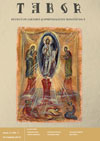
Keywords: Sacred Parallels; dogmatic works; Philokalia; passions; virtues
This article attempts to succinctly present John of Damascus’ teachings about passions and virtues, as well as the papers where these teachings are presented. In the fi rst part, the author refers to the paper Sacred Parallels, considered by scholars the Holy Father’s essential work with regard to moral-ascetic teachings. Nothing more than a large anthology of Bible texts and patristic texts, the paper is not representative for the saint’s teachings. The author then presents the moral-ascetic elements from John of Damascus’ theological works, especially in his dogmatic writings. Through this step, it is once again acknowledged the fact that, in the Orthodox faith, the dogmatic and the moral attitude go hand in hand. The last part is specifi cally concerned with the moral-ascetic works of the saint, On the Eight Spirits of Evil and On Virtues and Vices. The author presents the contents of these two short writings, as well as the most important ideas, with a special focus on the second work, included by Nicodemus of the Holy Mountain in his Philokalia. Through this, John of Damascus – par excellence, the dogmatic mind of our Church – earned himself a consecrated place among the ascetic and neptic Church Fathers.
More...
Keywords: Homeland; country; love; faith; war; exile; nostalgia; Tarkovsky
Up until recent times, the love for homeland was a noble feeling, a duty of honor. Today it’s either extinguished in favor of a limitless cosmopolitism or altered, being visible but in unimportant areas. Either way, the mystical soul of the love for homeland and its connection to God has been lost to a great extent. Normally, earthly homeland should be a mirror of the eternal, celestial Homeland, to whom the natural man aspires naturally through everything he does. Suddenly becoming a gift, as well as the fruit of a sacrifi ce fulfi lled by many generations, paid in blood many times, the Homeland must be served with defended and intensifi ed faith, as much as it is in everyone’s power, by the addition of personal deeds, accordingly. The great artists are those who fulfi ll and assume this responsibility to a greater extent, thus becoming, in happy cases, voices of their peoples in front of the world and, especially, in front of God. For Andrei Tarkovsky “Homeland is the country where you were born, where you were raised, and whose roots and culture you possess.” As a result, one’s homeland means landscape, history, culture… The spiritual element of the homeland is the one prevailing in Tarkovsky’s work; and, inside it, naturally, the Christian Orthodox faith he assumes and confesses, through his work and words. There are two situations which can render a more dramatic character of the love for Homeland, thus emphasizing it: the war (especially the one against invaders) and the exile. Andrei Tarkovsky knew them both. He knew the Great War to Defense the homeland directly, by the diffi culties that reverberated into his life, and indirectly, by his father’s participation to this war. Later, he also knew the exile, in which he was practically pushed by the hostile attitude of the political and cultural Soviet authorities, which obviously hindered his work. Though in exile, Tarkovsky carried his Homeland along, in his heart. He too was sick of that nostalghia he so often talked about. This thing is visible in his movies, whose feeling and tones are Russian, even when their space and time seem indeterminate. The love for homeland is treated in one way or another in each of the movies directed by this great director, especially by referring to its politic and cultural history. Tarkovsky’s heroes experience nostalghia for their Homeland, and, intricately, for its sufferings, but also for their own sufferings in relation to the Homeland. They also feel responsible for its spiritual prosperity and, thus, even more often, they experience guilt when failing to do so. They are concerned with its evolution and its status when this becomes precarious from a spiritual point view, with everything this implies, including serious moral misconducts. As such, they try to save everything that can be saved. In Tarkovsky’s movies, we fi nd debates on and feelings for a concentric and successive series of homelands, from that of the childho
More...